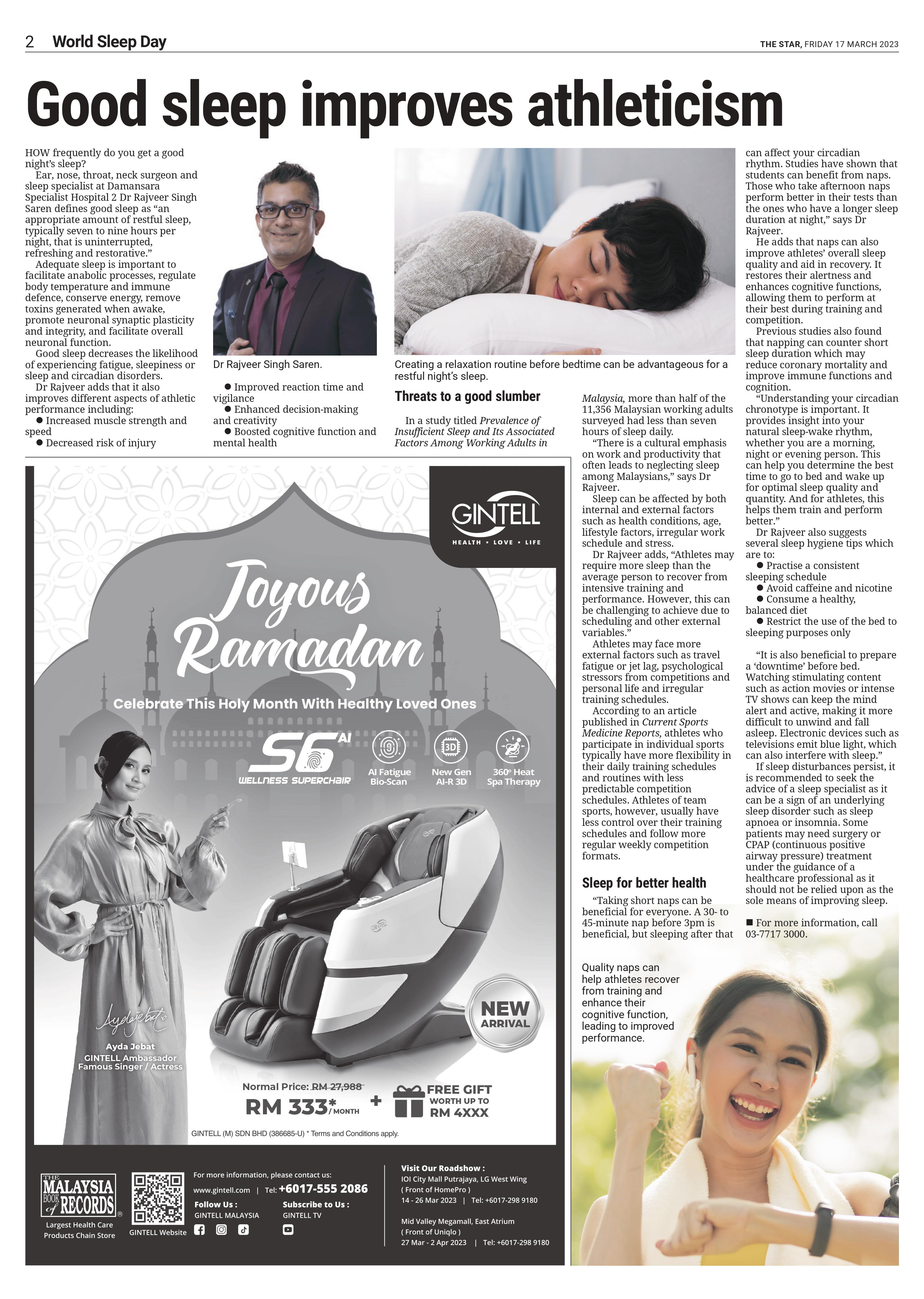World Sleep Day: Good sleep improves athleticism

Good Sleep Improves Athleticism
HOW frequently do you get a good night’s sleep? Ear, nose, throat, neck surgeon and sleep specialist at Damansara Specialist Hospital 2 Dr Rajveer Singh Saren defines good sleep as “an appropriate amount of restful sleep, typically seven to nine hours per night, that is uninterrupted, refreshing and restorative.” Adequate sleep is important to facilitate anabolic processes, regulate body temperature and immune defence, conserve energy, remove toxins generated when awake, promote neuronal synaptic plasticity and integrity, and facilitate overall neuronal function. Good sleep decreases the likelihood of experiencing fatigue, sleepiness or sleep and circadian disorders.
Dr Rajveer adds that it also improves different aspects of athletic performance including:
- Increased muscle strength and speed
- Decreased risk of injury
- Improved reaction time and vigilance
- Enhanced decision-making and creativity
- Boosted cognitive function and mental health
Threats to a Good Slumber
In a study titled Prevalence of Insufficient Sleep and Its Associated Factors Among Working Adults in Malaysia, more than half of the 11,356 Malaysian working adults surveyed had less than seven hours of sleep daily. “There is a cultural emphasis on work and productivity that often leads to neglecting sleep among Malaysians,” says Dr Rajveer. Sleep can be affected by both internal and external factors such as health conditions, age, lifestyle factors, irregular work schedule and stress. Dr Rajveer adds, “Athletes may require more sleep than the average person to recover from intensive training and performance.
However, this can be challenging to achieve due to scheduling and other external variables.” Athletes may face more external factors such as travel fatigue or jet lag, psychological stressors from competitions and personal life and irregular training schedules. According to an article published in Current Sports Medicine Reports, athletes who participate in individual sports typically have more flexibility in their daily training schedules and routines with less predictable competition schedules. Athletes of team sports, however, usually have less control over their training schedules and follow more regular weekly competition formats.
Sleep For Better Health
“Taking short naps can be beneficial for everyone. A 30- to 45-minute nap before 3pm is beneficial, but sleeping after that can affect your circadian rhythm. Studies have shown that students can benefit from naps. Those who take afternoon naps perform better in their tests than the ones who have a longer sleep duration at night,” says Dr Rajveer. He adds that naps can also improve athletes’ overall sleep quality and aid in recovery. It restores their alertness and enhances cognitive functions, allowing them to perform at their best during training and competition.
Previous studies also found that napping can counter short sleep duration which may reduce coronary mortality and improve immune functions and cognition. “Understanding your circadian chronotype is important. It provides insight into your natural sleep-wake rhythm, whether you are a morning, night or evening person. This can help you determine the best time to go to bed and wake up for optimal sleep quality and quantity. And for athletes, this helps them train and perform better.”
Dr Rajveer also suggests several sleep hygiene tips which are to:
- Practise a consistent sleeping schedule
- Avoid caffeine and nicotine
- Consume a healthy, balanced diet
- Restrict the use of the bed to sleeping purposes only
“It is also beneficial to prepare a ‘downtime’ before bed. Watching stimulating content such as action movies or intense TV shows can keep the mind alert and active, making it more difficult to unwind and fall asleep. Electronic devices such as televisions emit blue light, which can also interfere with sleep.” If sleep disturbances persist, it is recommended to seek the advice of a sleep specialist as it can be a sign of an underlying sleep disorder such as sleep apnoea or insomnia. Some patients may need surgery or CPAP (continuous positive airway pressure) treatment under the guidance of a healthcare professional as it should not be relied upon as the sole means of improving sleep.
Source: The Star Special
For more information, contact 03-7717 3000.




 Promotion
Promotion
 Find Doctor
Find Doctor


